Unit 2 Topic 1
Unit2__Topic1__SectionA精品课件-精品课件

资料下载:/ziliao/
范文下载:/fanwen/
试卷下载:/shiti/
教案下载:/jiaoan/
PPT论坛:
PPT课件:/kejian/
语文课件:/kejian/yuw en/ 数学课件:/kejian/shuxue/
Unit 2 Topic1
He has a big head
Section A
-
head
hair eyes nose mouth ears
face neck
Hi! 你看我的眼睛像不像字母e, 鼻子是nose 的首字母,嘴像不像mouth的第一个字母m, 耳朵里藏着小小的e,还有我的头花可是h形 的哦!你能记住我的样子吗?
We _h_a_v_e_ big ears.
They h_a_v_e__ small eyes.
It _h_a_s__ a long neck.
4
Work alone
B. Look at the picture and fill in the blanks.
This boy has a small face, small eyes, a big nose, a wide mouth and big ears. His hair is short.
15、一年 之计, 莫如树 谷;十 年之计 ,莫如 树木; 终身之 计,莫 如树人 。2021 年4月下 午12时 13分21 .4.221 2:13Ap ril 22 , 2021
16、提出 一个问 题往往 比解决 一个更 重要。 因为解 决问题 也许仅 是一个 数学上 或实验 上的技 能而已 ,而提 出新的 问题, 却需要 有创造 性的想 像力, 而且标 志着科 学的真 正进步 。2021 年4月22 日星期 四12时 13分0 秒12:13 :0022 April 2021
Unit2+Topic+1+课文详解课件2023-2024学年仁爱版九年级英语上册

A. too many
B. too much
C. much too
D. too
( B ) 2. — Don’t smoke. It’s ________ to our health.
— Sorry, I won’t do it again.
A. harm
B. harmful
C. harms
D. harmed
( C ) 3. He has a headache. He feels difficult ________.
A. breathe
B. breath
C. to breathe
D. to breath
单项选择
( C ) 4. She is so noisy that I can’t ________ her.
bees and butterflies dancing.
butterfly n.蝴蝶 see sb. doing sth.看见某人正在做某事 see sb. do sth.看见某人经常在做某事
• Kangkang: Everything has changed.
一切都变了。
• Michael: Do you want to have a picnic here?
Unit2 Topic 1
点击此处输入副标题
Section A
Section A
正在计划
• (Kangkang, Jane, Maria and Michael are planning a picnic for Sunday.)
• Jane and Maria: Kangkang, where shall we go? 野餐
我总是心情很差。
仁爱英语九年级上Unit2 topic1 复习课件
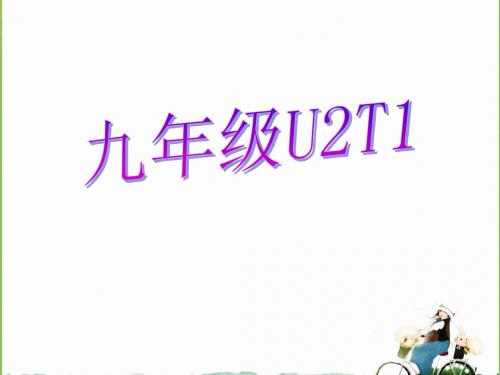
(三)单项选择 ( )1.—How long _____ you _____ here? • —For about two years so far. • A. have; studied B. did; live C. were; swimming ( )2.We have known each other _____ ten years ago. • A. for B. since C. about ( )3.There is _____ pollution in the world. We must stop it. • A. much too B. too much C.too many ( )4.I can’t stand _____ for you so long. • A. to wait B.waiting C.waited ( )5.—It smells terrible. What has happened here? • —Look, there is much waste gas _____ from the chemical • factory. • A. pours B.pouring C.poured
• • • • • •
4.所有的花、草和鱼儿都没有了! All the flowers, grass and fish have gone! 5.难闻极了。 It smells terrible. 6.有几个化工厂正往河里排放污水。 There are several chemical factories pouring waste water into the river. • (There be + sb. / sth. + doing sth. 表有某 人/ 某物正在做某事。)
仁爱版英语七年级上册Unit2__Topic1__同步检测题

Unit2 Topic1 同步检测题(总分值100分时间90分钟)第一局部听力(20分)Ⅰ.听句子,选择正确图片,有一幅多余。
每个句子读两遍。
(5分)1. ____2. ____3. ____4. ____5. ____Ⅱ.听句子,选择正确答语。
每个句子读两遍。
(5分)( )6. A. He is short. B. He is Jack. C. He is twelve.( )7. A. Yes, I do. B. Yes, I am. C. Yes, it isn’t.( )8. A. Yes, he does. B. No, he doe sn’t. C. Yes, he is.( )9. A. No, she isn’t. B. No, she doesn’t. C. No, she has a sister. ( )10. A. They’re students. B. They’re in Class One.C. They come from England.Ⅲ.听对话及问题,选择正确答案。
每组对话和问题读两遍。
(5分)( )11. A. Michael. B. Jim. C. Alice.( )12. A. Yes, I do. B. No, she doesn’t. C. Yes, she does. ( )13. A. No, he doesn’t. B. Yes, he does. C. Yes, he is.( )14. A. The UK. B. Canada. C. The USA.( )15. A. Yes, she does. B. No, she does n’t. C. No, she has long legs. Ⅳ.听短文,选择正确答案。
短文读两遍。
(5分)( )16. Wang Mei has ____ hair and her eyes are ____.A. long; bigB. short; bigC. long; small( )17. Wang Mei is ____.A. 10B. 11C. 12( )18. Wang Yin has a ____ nose and a ____ mouth.A. big; bigB. small; smallC. big; small( )19. They are in ____.A. the same schoolB. different schoolsC. the same grade ( )20. Wang Mei and her sister are ____.A. teachersB. studentsC. from Shanghai第二局部根底知识运用(55分)Ⅰ.单项选择。
八年级上册Unit1--Unit2重点短语,句子默写版
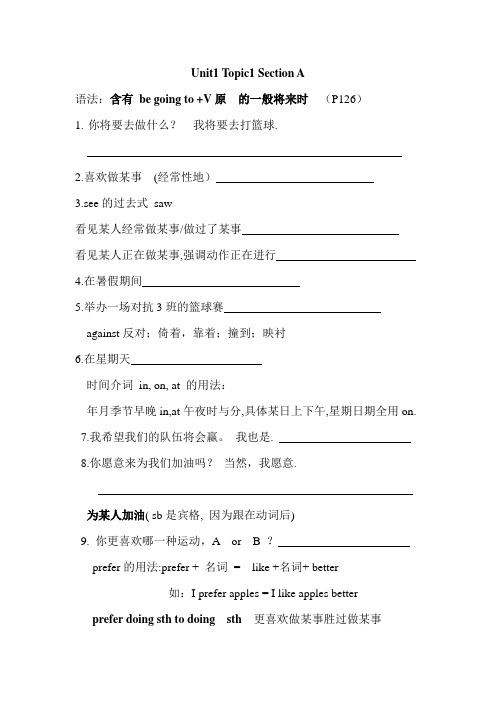
Unit1 Topic1 Section A语法:含有be going to +V原的一般将来时(P126)1.你将要去做什么?我将要去打篮球.2.喜欢做某事(经常性地)3.see的过去式saw看见某人经常做某事/做过了某事看见某人正在做某事,强调动作正在进行4.在暑假期间5.举办一场对抗3班的篮球赛against反对;倚着,靠着;撞到;映衬6.在星期天时间介词in, on, at 的用法:年月季节早晚in,at午夜时与分,具体某日上下午,星期日期全用on.7.我希望我们的队伍将会赢。
我也是.8.你愿意来为我们加油吗?当然,我愿意.为某人加油( sb是宾格, 因为跟在动词后)9. 你更喜欢哪一种运动,A or B ?prefer的用法:prefer + 名词= like +名词+ better如:I prefer apples = I like apples better prefer doing sth to doing sth 更喜欢做某事胜过做某事10.你划船多吗? 是的,非常多/ 不,很少。
(P2)11.你打算加入学校划船队吗?是的。
/不,我打算………(P2)13.区分:参加,加入(1)加入人或组织用:(2 ) 参加某项活动3个Unit1 Topic1 Section B1.你最喜欢什么运动?2.你最喜欢的运动员是谁?3.你知道关于他的一些事吗?4.他多高?他2.26米高。
(数词+名词+形容词)5.为…效力与…比赛和…玩6.我打算成为像他一样的篮球运动员。
7.那是我的梦想。
8.你长大后想当什么?我打算成为一名科学家。
(when引导时间状语从句,主将从现)What is he going to be when he grows up?9.在今后Unit1 Topic1 Section C1.非常喜欢2.骑自行车3.四“花费”①spend的两个词组(spend--spent)主语为人②pay for (pay--paid) 主语为人③cost (cost--cost)主语为物④take:It takes sb. some time to do sth. 主语为形式主语it4.爬山5.在体育馆6.擅长…7.学校运动会8.跳高9.跳远10.确信,确定(2个)①确定做某事be sure to do sth②对某事确定,有把握be sure of / about sth③be sure+that从句④be not sure+if / whether 从句11.There be句型的一般将来时结构:(there be中不能出现实义动词have)将有(2个)12.使某人/某物保持某种状态13.使某人做某事14.受…欢迎15.对什么有益反义词组16.全世界17.保持健康18.做某事的一个好方法19.她每天都在体育馆花费半小时锻炼。
仁爱英语九年级教材讲解Unit2知识点击

Unit 2 Topic 1 Section ANew wordsNew phrasesUseful expressions知识点击1.……and you could see bees and butterflies dancing.……你能看见蜜蜂和蝴蝶在飞舞。
see...doing意为“看见……正在做……",see 此处用作感官动词,可以加宾语再加宾补。
进口袋。
Andy saw his toy dog hidden behind the door.安他看见他的玩具狗被藏在门后。
【拓展】其他的感官动词,如hear,watc 也有类似的用法。
如:Tony heard someone singing songs in the next door.托尼听到有人正在隔壁房间唱歌。
Every day lots of people go to the Tian'anmen Square to watch the flag go up.每天很多人去天安门广场看升红旗。
2.The flowers and grass have gone!鲜花和绿草都消失了!go在此处为不及物动词,意为“不复存在,不见了”。
如:The pain has gone.疼痛消失了。
【链接】go还有“变得,进展”等意思。
如:The fish is going bad.鱼快变质了。
Everything goes well. 一切都好。
3.Look,there are several chemical factories pouring waste water into the stream.看,有几个化工厂正往小溪里排放废水。
(1)pour...into…意为"向……投入"。
如:The government has poured millions of yuan into education.政府在教育上投资数百万元。
初中英语仁爱版九年级上册Unit2Topic1知识点

初中英语仁爱版九年级上册Unit2Topic1知识点Unit2 Topic1Section A1.gone(不及物动词)不复存在,不见了,丢失,失窃2.XXX有某人或某物正在做某事Eg:There are some boys running on the playground.有一些男孩正在操场上跑步。
XXX.有某人/某物做某事Eg:There is no time to think.没有时间去想了。
3.pour...into...把...倒入...4.waste(形容词)废弃的,丢弃的,无用的(名词)废弃物,废料(动词)浪费waste of time浪费时间waste of money浪费金钱Section B1.It’s difficult for sb. to do sth.做某事对某人来说很困难2.howlong多久,多长时间,用来询问或谈论某段时间,答语通常用for,since等引导的时间状语,谓语动词必须为延续性动词。
—How long have you learned English?—I have learned English for three years.3.in a bad mood不爽,心情不好。
4.bear(动词)忍受,蒙受(名词)熊,鲁莽的人XXX 忍受...,对...有耐烦Eg:Please bear with me while I ask some questions.当我发问你时,请耐烦些。
作动词时常能够stand交换,stand蒙受,禁受;忍受,容忍,常与can,could 1连用。
stand+名词/代词/doing:忍受某人/某事/做某事I can’t stand working in an offic e.我几乎受不了在办公室工作。
5.anyway不管如何,使用时常常位于句子开头迁移转变处。
6.write to写信给...Section C1.be harmful to =do harm to =be bad for对...有害harm sb./sth.伤害某人/某物Reading in the sun is XXX在太阳底下读书对眼睛有害。
仁爱英语2013年湘教版第二单元unit 2 topic 1 section A B 课文知识点分析
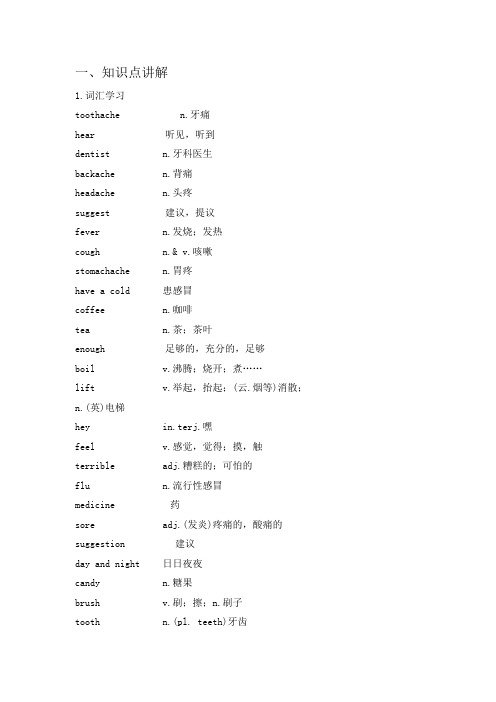
一、知识点讲解1.词汇学习toothache n.牙痛hear 听见,听到dentist n.牙科医生backache n.背痛headache n.头疼suggest 建议,提议fever n.发烧;发热cough n.& v.咳嗽stomachache n.胃疼have a cold 患感冒coffee n.咖啡tea n.茶;茶叶enough 足够的,充分的,足够boil v.沸腾;烧开;煮……lift v.举起,抬起;(云.烟等)消散;n.(英)电梯hey in.terj.嘿feel v.感觉,觉得;摸,触terrible adj.糟糕的;可怕的flu n.流行性感冒medicine 药sore adj.(发炎)疼痛的,酸痛的suggestion 建议day and night 日日夜夜candy n.糖果brush v.刷;擦;n.刷子tooth n.(pl. teeth)牙齿lie 躺,平躺lie down 躺下1.重点句型1. You should see a dentist. should/shouldn’t 应该/不应该2. —I have a headache. —You should stay in bed and have a good sleep.3. —I have a fever. —You should drink enough boiled water.4. —I can’t sleep well at night. —You shouldn’t drink coffee or tea in the evening.5. —I have a backache. —You shouldn’t lift heavy things.6. You shouldn’t read in the sun.7. He should see a doctor.8. You shouldn’t eat too m uch.2.课文呈现Betty: Hello, Kangkang! You don’t look well. What’s wrong with you? Kangkang: I have a toothache.Betty: I am sorry to hear that. You should see a dentist. Kangkang: I think I will.Betty: I hope you will get well soon.Kangkang: Thank you.3.课文知识点讲解1. What’s wrong with you? 你怎么了?类似的说法还有:what’s the trouble? What’s the matter with you? Is there anything wrong with…?等。
仁爱版英语九年级Unit 2 Topic 1知识点

Unit 2 Topic 1(Grade Nine)Ⅰ、词组及用法1、go①去②不复存在,不见了,丢失,起作用eg. The pen has gone.Everything goes well.2、pour…into…把…倒入…eg. Many factories pour waste water into the river.3、waste①n.浪费,损耗:It’s a waste of money.②v.浪费:Don’t waste water.③adj.废弃的,无用的:much waste water 许多废水4、change①n.变化:Great changes have changed.零钱:Here is your change.②v.改变:Everything has changed.5、pollute(v.)-pollution(n.)air pollution 空气污染The cars have polluted the air.6、breathe(v.)――breath(n.)breathe in “吸入”breathe out “呼出”hold one’s breath 屏住呼吸take a (deep)death(深深地)吸一口气7、in a bad mood 心情差8、can’t/couldn’t bear+名词/代词/动名词无法忍受…9、be harmful to=do harm to 对……有害10、make too much noise 制造太多噪音11、go deaf 变聋lose one’s hearing 丧失听力have hearing loss 听力丧失12、quite a few=many13、quite a little=much14、no better than:同……一样坏,不比……做得好This road is no better than that road.15、around①在…四周:There are many people around us.②在…各处:He often shows me around the school 1.③大约:It’s about/around seven o’clock now.16、high blood pressure 高血压17、cause breathing problems 引起呼吸问题18、all sorts/kinds of…各种各样…19、environmental problems 环境问题20、in many ways 在许多方面21、with the increase in population 随着人口增长22、with the development of industry 随着工业发展23、in the fields 在田地里24、as well 也(句末)25、work in strong light 强光下工作26、There be sb/sth doing sth 有某人/某物正在做某事eg. There are some boys playing soccer on the playground.There is a car collecting rubbish over there.Ⅱ、语法现在完成时与一般过去时的区别1、结构现在完成时:主语+have/has+动词过去分词…一般过去时:主语+动词的过去式+…2、定义现在完成时表示过去发生的动作或存在的状态,持续到现在或对现在的影响。
仁爱版七年级英语上册Unit2 Topic1 _课文重难点讲解

Unit2 Topic1 课文重难点讲解【1】I have a small nose, but he has a big one. 我长着小鼻子,但是他长着大鼻子。
1) 这里的have是实义动词,意为“拥有”,第三人称单数用has。
如:I have a nice knife.我有一个漂亮的小刀。
I don’t have a nice knife.我没有一个漂亮的小刀。
—Do you have a nice knife?你有一个漂亮的小刀吗?—Yes, I do./No, I don’t.是的,我有。
/不,我没有。
He has a pen.他有一支钢笔。
He doesn’t have a pen.他没有一支钢笔。
此句型还可以转换成主语(物)+be动词+形容词。
如:I have a small nose, but he has a big one.的同义句为:My nose is small, but his nose is big.我的鼻子小,但他的鼻子大。
2) one在这里作代词,用来替代已提及的或已知道的某个名词。
如:You have a long ruler, but Ann has a short one.你有一把长尺子,但安有一把短尺子。
【2】—Oh, I know. You are Kangkang.哦,我知道了,你是康康。
—Yes,you’re right.是的, 你是正确的。
(l) know 知道,了解,懂得,认识(2)right adj.正确的right在这里是形容词。
You are right.相当于That’s right.你是正确的(你说得对)。
【拓展】right n.右边反义词: left左边【3】Michael, who is your favorite actor? 迈克尔, 谁是你最喜欢的演员?favorite作形容词,意为“最喜欢的……”,相当于like …best。
仁爱英语八年级Unit2 Topic1试题

Unit 2 Topic 1(满分:100分;时间:90分钟)第一部分:听力(15分)Ⅰ.听句子,选择正确应答语。
每个句子读一遍。
(5分)( ) 1. A. I have a bike. B. I have a fever. C. I don’t like it.( ) 2. A. Not at all. B. Thanks a lot. C. You’re welcome. ( ) 3. A. That’s a good idea. B. What’ s wrong with you?C. Don’t worry. I’ll take you to the hospital.( ) 4. A. That’s OK. B. Not too bad . C. I’m sorry to hear that. ( ) 5. A. You shouldn’t lift heavy things.B. You shouldn’t drink coffee or tea in the evening.C. You shouldn’t drink lots of boiled water.Ⅱ.听对话,选择正确答案。
对话读两遍。
(5分)( ) 6. Where is the man now?A. At home.B. At the doctor’s.C. In a school. ( ) 7. How is the man feeling now?A. Much better.B. Not bad.C. Even worse. ( ) 8. What’s wrong with the man?A. He has a toothache.B. He has a backache.C. He has a cold.( ) 9. Did he eat anything for breakfast?A. Yes, he did.B. No, he didn’t.C. Only a little. ( ) 10. How many pills should the man take each time?A. One.B. Two.C. Three.第二部分:笔试(85分)Ⅰ.单项选择。
Unit1-Unit2重点词组整理仁爱版八年级英语上册

英语八年级上册词组&句型(U1-U2)Unit 1 Topic 11.计划打算做某事be going to do sth2.看见你打篮球see you play basketball3.在暑假期间during the summer holidayhave a basketball game against Class Three5.为我们加油cheer us on6.更喜欢划船prefer rowing7.经常划船row much8.相当多quite a lot9.加入学校划船队join the school rowing team10.最喜欢姚明like Yao Ming best11.知道关于某人的一些事情know something about sb.12.效力于play for13.长大grow up14.在将来in the future15.去骑自行车go cycling16.去爬山go mountain climbing/ climb mountainsspend half an hour exercising in the gym18.擅长be good at= do well in…有好处be good for20.校运动会sports meet21.参加take part in= join in= be in22.跳高the long jump23.跳远the high jump24.使他强壮make him strong25.全世界all over the world26.后天the day after tomorrow27.保持她的心肺健康keep her heart and lungs healthy28.一种保持健康的好方法a good way to keep fit/ healthy29.帮助他们放松help them relax30.过去的20年for the last 20 yearsa very famous soccer player32.到达北京arrive in Beijing33.很遗憾It is a pity that=It is too bad that…34.离开前往A leave for A35.离开A前往B leave A for B重要句型:1.你打算要做什么?What are you going to do?2.我希望我们队会赢。
仁爱英语九年级上册Unit2 短语句子

仁爱英语九年上册Unit2 Topic1 重点短语和句子Unit2 Topic1 Section A1看到某人正在做某事see sb. doing sth.2听起来很好sound great3真脏!What a mess!4真可耻!What a shame!5把...倒入pour ...into6当然不of course not7砍到cut down8You can see bees and butterflies dancing.你可以看到蜜蜂和蝴蝶在跳舞。
9有几家化工厂把废水排到小溪。
There were several chemical factories pouring waste water into the stream. 10Everything has changed一切都变了12 it was too dirty for me to live in.但是它对我来说太脏了无法居住Unit2 Topic1 Section B1.have a pain in the throat喉咙痛2.produce terrible gas产生难闻气体3.make my chest hurt使我胸痛4.make people sick使人们生病5.what was worse更糟的是6.make too much noise制造太多噪音7.in a bad mood心情不好8.solve the problem解决问题9.by the way顺便问一下10.cause too many problems引起太多问题11.cause breathing problems引起呼吸问题12.make great efforts to do sth.尽力做某物13.nosie/air/light pollution噪音/空气/光污染14.be harmful to对。
有害15.make a mess of使。
仁爱版九年级知识归纳 Unit2 Topic1
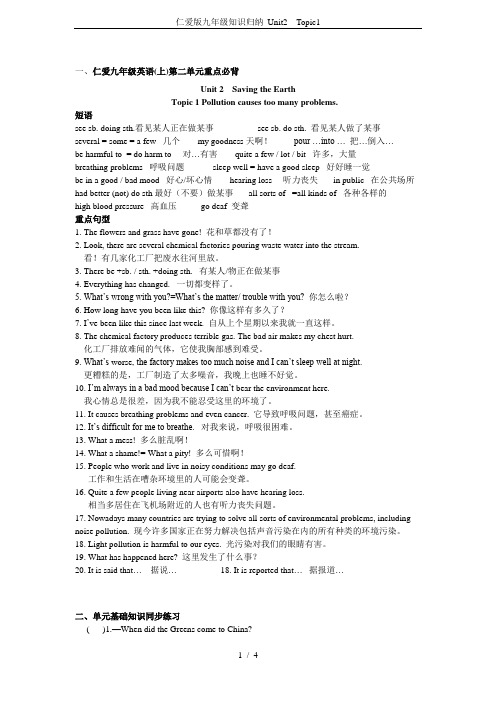
一、仁爱九年级英语(上)第二单元重点必背Unit 2 Saving the EarthTopic 1 Pollution causes too many problems.短语see sb. doing sth.看见某人正在做某事see sb. do sth. 看见某人做了某事several = some = a few 几个my goodness 天啊!pour …into … 把…倒入…be harmful to = do harm to 对…有害quite a few / lot / bit 许多,大量breathing problems 呼吸问题sleep well = have a good sleep 好好睡一觉be in a good / bad mood 好心/坏心情hearing loss 听力丧失 in public 在公共场所had better (not) do sth最好(不要)做某事all sorts of =all kinds of 各种各样的high blood pressure 高血压go deaf 变聋重点句型1. The flowers and grass have gone! 花和草都没有了!2. Look, there are several chemical factories pouring waste water into the stream.看!有几家化工厂把废水往河里放。
3. There be +sb. / sth. +doing sth. 有某人/物正在做某事4. Everything has changed. 一切都变样了。
5. What’s wrong with you?=What’s the matter/ trouble with you? 你怎么啦?6. How long have you been like this? 你像这样有多久了?7. I’ve been like this since last week. 自从上个星期以来我就一直这样。
仁爱版九年级英语上册Unit 1--2重点词组默写版及答案

仁爱版九年级英语上册重点短语默写版Unit 1 Topic 1一、重点短语1、发生,进行2、跟……保持联系3、改革开放4、取得进展,取得进步5、与……取得/失去联系6、顺便问一下7、一所英语暑假期学校8、从……中学习(到)……9、有时间做某事10、没有时间做某事11、残疾儿童12、不但……而且13、成功地做某事14、梦想,展望15铃响了。
16、(某人)去过某地、(某人)曾经到过……17、(某人)已经去……了(不在说话地)18、做农活19、回来20、发挥作用二、短语运用,用所给短语的适当形式填空。
keep in touch with, make friends, take place,put on, be satisfied with1.Great changes have in our village these years.2. Our class will a funny show at the New Year's party.3.Now young people usually each other by WeChat.4.My parents me because I won first place in the English exam.5. Tom is an honest boy, so all of us want to with him .Unit 1 Topic 2一、重点短语1、到目前为止2、采取措施做某事。
3、幸亏,由于4、增了,增长了5、已知的,知名的6、被……所环绕7、百货公司8、给某人打电话9、彼此,互相10、迷路11、而且,另外,更重要的是12、控制人口13、发展中国家发达国家14、人口问题15、因为,由于16、满足众的日常需求17、实行,进行18、名胜古迹19、禁止砍伐树木20、在做某事方面很有成效。
二、短语运用,用所给短语的适当形式填空,使句子完整通顺。
仁爱英语九年级unit2topic1
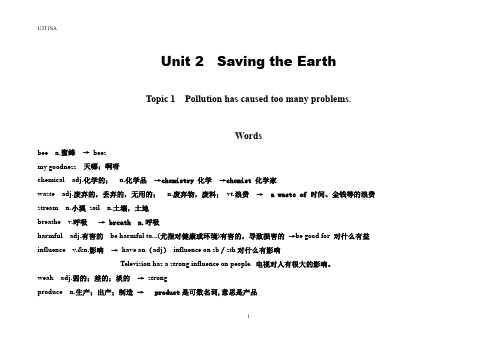
Unit 2 Saving the EarthTopic 1 Pollution has caused too many problems.Wordsbee n.蜜蜂→beesmy goodness 天哪;啊呀chemical adj.化学的;n.化学品→chemistry 化学→chemist 化学家waste adj.废弃的,丢弃的,无用的;n.废弃物,废料;vt.浪费→ a waste of 时间、金钱等的浪费stream n.小溪soil n.土壤,土地breathe v.呼吸→ breath n.呼吸harmful adj.有害的be harmful to...(尤指对健康或环境)有害的,导致损害的→be good for 对什么有益influence v.&n.影响→have an(adj)influence on sb∕sth对什么有影响Television has a strong influence on people. 电视对人有很大的影响。
weak adj.弱的;差的;淡的→strongproduce n.生产;出产;制造→ product是可数名词,意思是产品1prodcution是不是可数要看具体情况,意思是生产的动作,生产的过程之类的。
gas n.气体;煤气chest n.胸部;箱子,盒子→bosom∕breastanyway adv.不管怎样→It was an old bike anyway. 不管怎样,这是辆旧车。
→Anyway we must finish this work today. 无论如何,我们今天必须完成这项工作。
following adj。
下述的,下列的;(时间上)接着的→following problems 下述的问题, the following year第二年 the following ,跟随者。
coal n.煤electricity n.电;电流→ electric 是主要指电气,电动方面的electricity则是主要表达电流,电学等方面的partner n.搭档,合作者deaf adj.聋的print v.印刷hearing loss 听力丧失disturb v.打扰;扰乱harm n.&v.危害;伤害;损害including prep.包括……在内title n.标题,题目23rubbish n.垃圾;废物sawmill n.(把木材锯成木板的)锯木厂nearby adj.附近的effect n.效果;作用create v.造成;创造 → creationindustry n.产业,工业destroy v.破坏,毁坏 →destroyed 就是彻底玩完了,没有挽回的余地,非常强硬的, damage 只是损坏而已blood n.血,血液pressure n.压力;压迫;压强 →在物理意义中"压力"可数,可用pressures. 像血压等blood pressure,这种则不可数。
仁爱版九年级Unit2 Topic1 课文重点
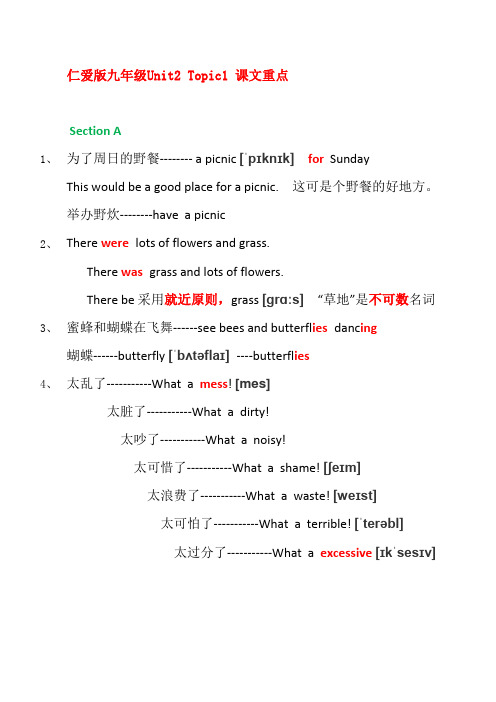
仁爱版九年级Unit2 Topic1 课文重点Section A1、为了周日的野餐-------- a picnic [ˈpɪknɪk]for SundayThis would be a good place for a picnic. 这可是个野餐的好地方。
举办野炊--------have a picnic2、There were lots of flowers and grass.There was grass and lots of flowers.There be 采用就近原则,grass [ɡrɑːs]“草地”是不可数名词3、蜜蜂和蝴蝶在飞舞------see bees and butterfl ies danc ing蝴蝶------butterfly [ˈbʌtəflaɪ]----butterfl ies4、太乱了-----------What a mess! [mes]太脏了-----------What a dirty!太吵了-----------What a noisy!太可惜了-----------What a shame! [ʃeɪm]太浪费了-----------What a waste! [weɪst]太可怕了-----------What a terrible! [ˈterəbl]太过分了-----------What a excessive[ɪkˈsesɪv]5、真有趣---------what an interest ing (对物,物对人产生影响)多么感兴趣------what an interest ed (对人)多么令人兴奋----------what an excit ing!多么激动啊-------what an excit ed!真令人担忧----------what a worry ing!多么担心啊-------what a worry ed!多么令人厌烦----------what a boring !真无聊!------what a bor ed!多么令人失望----------what a disappoint ing!多么失望啊!-------what a disappoint ed!6、1、空气清新------the air is fresh2、很难闻----smell terrible3、河水太脏了--------the water is so dirty.4、河水清澈----------the water is clean5、把废水倒入河里--------pour waste into the stream [striːm] 7、There be +sth + doing sth .There are two boy playing games under the tree.8、1、pollute(v)污染----pollution 污染 water pollution 水污染2、砍伐-----cut down3、天哪----oh ,my goodness! =my god!4、发生什么事了?----What has happened?5、一切都变样了-----Everything has changed.6、现在,....没有了------- Now ,.....have/has gone.Section B1、1、看起来很虚弱---------look weak[wiːk]2、看起来气色不错-------look good3、呼吸breath e[briːð] 呼吸名词:breath2、最近怎么样了?---------How have you been??3、咳嗽少了----have coughed less4、你看过医生吗------- Have you seen a doctor?setion C1、harm伤害----harm ful有害的1、be harmful to:对…有害2、be harmful for:有害于...(意外伤害)2、people's health= humans' healtha people 一个民族,the people 人民;people 的单复数形式一样,指人时,不可数;民族时,是可数human表示人类,复数:human s3、noise噪声-------nois y噪声的-----noise less 无声4、1、变聋------go deaf2、变坏------go bad3、变瞎----go blind [blaɪnd]4、变疯--go mad/crazy [kreɪzi]5、1、相当多--quit a few +可数n2、相当多--quit a little+不可数n6、hear -----heard过去式-----heard过去分词 hear ing听力听力丧失----have hearing losshave hearing loss = lose one's hearing7、1、lose(v)---- lost(过去式)----lost(过去分词)---丢失;迷失2、loss(n)----loss是个名词,意思是损失8、teen青少年---teen age青少年的 ---teenag er青少年65岁的老人-----65-year-old people9、据报道-------It was report ed that ...据说------It is said that our teacher has been to Africa.据说我们的老师曾去过非洲It is believ ed that China will become stronger and stronger 10和...一样不好------no better than、不比....好---------not better thanYou are poor at English.I am no better than you.和你一样糟But Tom is not better than we.不比我们好11disturb--disturb ance(n) 干扰--- disturb ing(adj)---disturb ed 、12be harm ful to … 对…有害处、do harm to ... 对 ... 有害处Reading in the sun is harmful to your eyes= Reading in the sun does harm to your eyes.感到不舒服-----feel uncomfortable[ʌnˈkʌmftəbl]13、感到不愉快-------feel unpleasant感觉很糟糕--------------feel terrible看起来很虚弱---------look weak[wiːk]comfort 舒适---comfort able----un comfortable不舒服的141、染病-----become sick2、失聪-----become deaf[def]、setion D1、1、我们周围------around us2、空气污染----air pollution3、土壤污染------soil pollution4、噪音污染----noise pollution5、和光污染-----light pollution2、health (n)------health y(adj)健康的-----un healthy不健康的3、be bad for health----对健康有害4、土壤soil=s+oil油 -----土壤有油5、燃烧burn -----burning燃烧的----burning oil6、人口增长-------the increase [ɪnˈkriːs] in population工业发展----the develop ment of industry [ˈɪndəstri] 7、1、实施-----put into practice2、把垃圾放进垃圾桶-------put litter into the dustbin3、往地里扔很多垃圾-----put lots of litter into the land垃圾----litter 是不可数8、stroy 破坏(story故事)-----de stroy破坏(de前缀表示加强)9、1、失去听觉-----lost one's hearing2、失聪------make sb deaf3、高血压----high blood pressure10也-----as well/too/also/either区别:、too/as well 用于肯定和疑问句,在句末。
七年级上册仁爱英语教材讲解Unit2知识点击
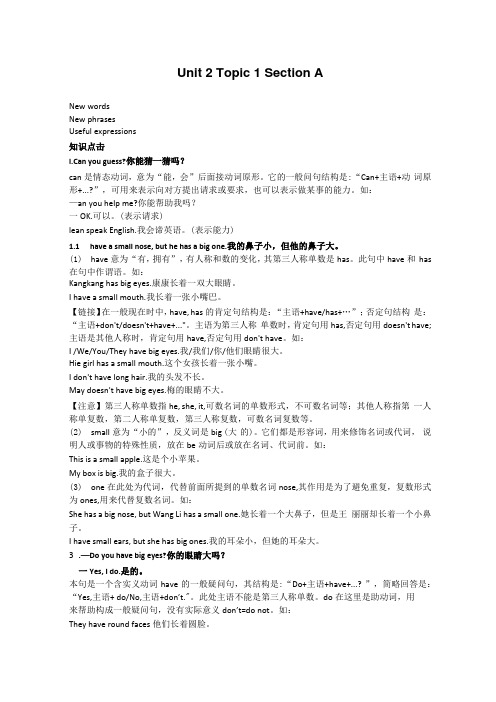
Unit 2 Topic 1 Section ANew wordsNew phrasesUseful expressions知识点击l.Can you guess?你能猜一猜吗?can是情态动词,意为“能,会”后面接动词原形。
它的一般问句结构是:“Can+主语+动词原形+...?”,可用来表示向对方提出请求或要求,也可以表示做某事的能力。
如:—an you help me?你能帮助我吗?一OK.可以。
(表示请求)lean speak English.我会谛英语。
(表示能力)1.1have a small nose, but he has a big one.我的鼻子小,但他的鼻子大。
(1)have意为“有,拥有”,有人称和数的变化,其第三人称单数是has。
此句中have和has 在句中作谓语。
如:Kangkang has big eyes.康康长着一双大眼睛。
I have a small mouth.我长着一张小嘴巴。
【链接】在一般现在时中,have, has的肯定句结构是:“主语+have/has+…”;否定句结构是:“主语+don't/doesn't+have+..."。
主语为第三人称单数时,肯定句用has,否定句用doesn't have;主语是其他人称时,肯定句用have,否定句用don't have。
如:I /We/You/They have big eyes.我/我们/你/他们眼睛很大。
Hie girl has a small mouth.这个女孩长着一张小嘴。
I don't have long hair.我的头发不长。
May doesn't have big eyes.梅的眼睛不大。
【注意】第三人称单数指he, she, it,可数名词的单数形式,不可数名词等;其他人称指第一人称单复数,第二人称单复数,第三人称复数,可数名词复数等。
- 1、下载文档前请自行甄别文档内容的完整性,平台不提供额外的编辑、内容补充、找答案等附加服务。
- 2、"仅部分预览"的文档,不可在线预览部分如存在完整性等问题,可反馈申请退款(可完整预览的文档不适用该条件!)。
- 3、如文档侵犯您的权益,请联系客服反馈,我们会尽快为您处理(人工客服工作时间:9:00-18:30)。
Unit 2 Topic 1
Section A
学习目标:
1、学习头部各部位名称以及big, small等形容词的用法;
2、学习用have/has对人的外貌进行简单的描述。
预习指导:
一、通过听录音学习第27-28页的单词,要求:会读,会默写,记住汉意
二、完成1c,把身体部位和图片连线,然后仿照例句用have/has造句。
三、朗读1a三遍,口头翻译1a.
四、在1a中找出下列句子:
1、我长着一个小鼻子,而他长着一个大鼻子。
2、你有大眼睛吗?是的,我有。
3、是的,你说对了。
五、根据1a内容,完成1b.
六、观察2a图片并用头部各部位名称填空。
七、试着用have/has完成2b.
注:have,“有,吃,喝”;has是have的形式,也就是说,当主语是he, she, it等第三人称单数时用,当主语是第一人称、第二人称或第三人称复数时,如I, you, we, they等用。
如:Kangkang big eyes. I a small mouth.
课堂学习过程
一、检查单词
1、猜
2、有,吃,喝(三单)
3、小的
4、大的
5、鼻子
6、眼睛
7、知道,认识
8、正确的9、耳朵10、头发11、头
12、脸13、脖子14、嘴(复数)
15、圆形的16、长的17、宽的
二、听单词,检查1c.
三、学习1a, 1b
1、听1a,展示并核对1b答案;
2、朗读并表演1a;
3、模仿1a编对话,并展示。
四、听2a,核对答案并朗读。
五、展示并核对2b答案。
六、探究学习重难点have/has句型
陈述句:
一般疑问句:
肯定回答:
否定回答:
七、学习3a, 3b
1、听读3a并注意音标,找出3a中的读音规律。
2、根据3a中的读音规律,朗读3b中的单词,听并跟读。
八、当堂检测
1. This is Bruce. He (have) a big head.
2. Mr. Li has long hair, small nose and wide mouth.(a, an, the, /)
3. We in the same class and we long necks.(be, have)
4. They have a car.(变一般疑问句并作肯定和否定回答)
学习小结:
Section B
学习目标:
1、继续学习描述外贸的形容词的用法;
2、巩固have/has的用法。
预习指导:
一、通过听录音学习第29-30页的单词,要求:会读,会默写,记住汉意。
二、观察P30 3,写出并记住身体各部位名称。
三、认真观察4中例句,仿照例句改写句子(写到书上)
四、读P29 1a三遍,口译汉语,并找出下列句子:
1、你最喜欢的演员是谁?
2、他是中国人,他长着一个大鼻子。
3、他长着长头发吗?不,他没有。
4、他长着大嘴巴吗?是的。
5、我明白了。
五、根据1a内容,完成1b.
课堂学习过程:
一、检查单词
1、最喜爱的
2、演员
3、中国人,汉语
4、do的三单形式
5、胳膊
6、手
7、腿8、脚(复数)9、短的,矮的
二、展示并核对P30 3.
三、展示P30 4,并总结规律。
四、学习1a, 1b, 1c
1、听读1a,并核对1b答案;
2、朗读1a,并表演;
3、编写新的对话并展示。
五、听录音,完成2并核对答案。
六、探究学习重难点:
---Does he have long hair? ---Yes, he does./No, he doesn’t.
当实意动词充当谓语时,常用助动词do/does构成疑问句和否定句以及疑问句的简略回答。
当主语是第三人称单数时用does.
1. I have a round face.
否定句:
一般疑问句:
肯定及否定回答:
2. He has big eyes.
否定句:
一般疑问句:
肯定及否定回答:
试比较含有be动词的句式:
1. I am twelve years old.
否定句:
一般疑问句:
肯定及否定回答:
2. Lucy is in Class One, Grade Seven.
否定句:
一般疑问句:
肯定及否定回答:
你发现了什么?
学习小结:
Section C
学习目标:
1、通过听录音熟练掌握31-32页的新单词。
2、掌握名词单数变复数的方法。
3、掌握不含be动词的一般疑问句和特殊疑问句及其回答。
4、能够掌握描述个人信息的表达。
预习指导:
一、听录音熟读31-32页的单词,并默写在下边。
1、男孩
2、来
3、来自
4、姐妹
5、不同的
6、小刀
二、阅读19页1a,读一读,想一想,回答以下几个问题。
1、用and连接几个名词时,名词前面的冠词可以省略或者共用吗?
2、我来自英格兰。
3、我有一张圆脸和小眼睛。
4、她有一张圆脸,大眼睛,一个小鼻子和一张小嘴巴。
5、我们在相同的学校,但是在不同的班级。
三、根据1a做1b.
四、观察3a的图片,并把图片和对话连线。
另外,注意含有have, has的陈述句变成一般疑问句应借助,。
五、根据所给的音标填上4a的单词。
课堂学习过程:
一、检查单词;
二、小组内学习1a。
1、组长从读音,句意和重难点三方面组织学习。
2、小组展示读音和重难点。
3、模仿1a写出一篇介绍自己和朋友外貌的小作文。
三、核对2a的答案,注意做阅读题的方法和技巧。
四、学习3a, 3b。
掌握没有be动词的陈述句变一般疑问句的方法。
1. I have long arms.
you long arms?
Yes, ./No, .
2. She has a small mouth.
she a small mouth?
Yes, ./No, .
五、当堂检测:
1. The two (knife) are in the box.
2. That boy (have) a small nose.
3. They are in the same (grade), but in different (class).
4. She has two big eyes.(改为一般疑问句,并做肯定,否定回答)
?Yes, ./No, .
5. He has long legs.(同义句)
六、反馈小结:
Section D
学习目标:
1、复习本单元所学的句型及单词;
2、熟练掌握并运用不含be的一般疑问句;
3、学会用英语简单介绍自己及朋友的外貌。
课堂学习过程:
一、写出下列不含be动词的一般疑问句及答语。
1. I have a small nose.
2. He has big eyes.
3. They have round faces.
二、做2,并根据34页Project表格的内容写一篇作文。
三、当堂检测:
(一)用be(am, is, are)或者have/has填空。
1. I from Henan, but he from Anhui.
2. My hair short, but she long hair.
3. That girl big eyes and big ears. She very nice.
4. Her feet small and her hands small, too.
5. They round faces.
(二)句型转换:
1. He has long arms and legs.(改为一般疑问句)
2. They are from England.(同义句转换)
3. We are in different grades.(同义句转换)
We are in same .
4. This is a knife.(改为复数)
5. (do) your sister and your mom have different faces?(三)用所给词的适当形式填空
1. His (foot) are big.
2. Jack has two small (knife).
3. That boy (has) a small nose and a wide mouth.
4. (do) your sister and your mother have different faces?
5. (do) she (has) friends? Yes, she does.
6. Our English teacher (have) a car.
7. Her ears (be) small and her hair (be) short.
8. (she) name is Amy.
9. What are (this)?
10. Are they (she) boxes?
三、反馈小结:。
